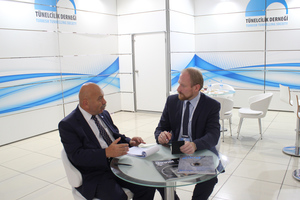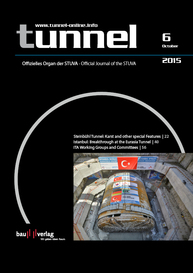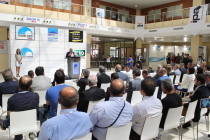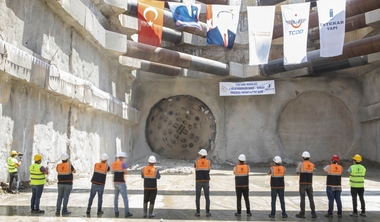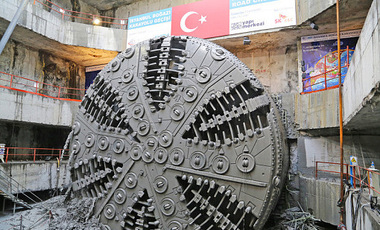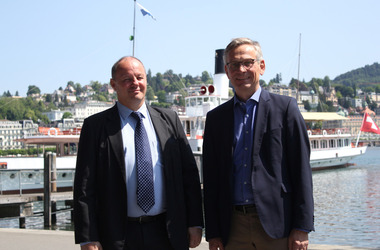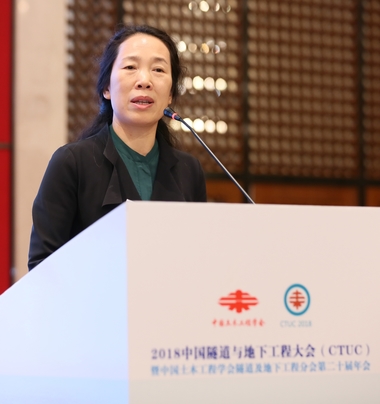Interview with Prof. Dr. Nuh Bilgin
The Turkish Tunnelling Society (TTS) was established in August 2012 in response to a growing demand from the national tunnelling industry. Since then TTS has grown with tremendous speed: The society has 700 individual members and 47 cooperate members.
On occasion of the Tunnel Expo Turkey in late August, tunnel editor Marvin Klostermeier had the chance to talk with TTS chairman Prof. Dr. Nuh Bilgin about tasks and objectives of the young tunneling society and the prospects of tunneling in Turkey over the next few years.
Prof. Bilgin, which are the most important instruments and activities, with which the TTS is promoting Turkish tunnelling?
The TTS is organizing conferences, short courses, seminars and technical trips. We publish also a journal called “tünel” every two months. Anyone who is interested in the journal can get the hard copy or download it from our web page [//www.tunelder.org.tr" target="_blank" >www.tunelder.org.tr:www.tunelder.org.tr].
We also encourage our members to participate in ITA conferences and organize group trips. This year 60 of our members participated in the World Tunnel Congress in Dubrovnik, and we submitted 16 papers. We give rewards to the best undergraduate and graduate thesis.
In cooperation with Demos Fair company we just organized the second Tunnel Expo Turkey, aiming to eventually make it one of the biggest events in the world for exhibitors from the tunneling industry.
How many tunnelling projects are currently being planned and built in Turkey?
Turkey is planning to spend 35 billion Euros in near future in tunneling – let me put it this way: ‘It is like a bullet coming from a gun – you can’t stop it until it reaches the target’.
Before 2004 the length of Metro Lines in Istanbul amounted to 45 km. Between 2005 and 2013, 141 km of metro tunnel were constructed, and 400 km of tunnels are planned to be realized between 2014 and 2019.
Currently there are 1600 hydropower projects statewide, and 850 tunnels are planned to be constructed for hydropower projects. Utility tunnels to be built in the near future in Istanbul will have a length of 47 km, and with other cities the number rises up to 80 km. Road tunnels to be built in the next years are expected to have a length of 85 km and for railway tunnels the number is 78 km. Many hundreds of kilometres per year of mine access tunnels are also expected to be constructed.
Can you give us an overview of the most important current projects?
Every day around 14 million people travel in Istanbul and the Marmaray Tunnel, operational since 2013, provides mass transit for the city‘s population. The Marmaray Project is one of the major transportation infrastructure projects in the world at present and a big success for Turkish contractors. The main project includes an immersed tube tunnel, bored tunnels, cut-and-cover tunnels.
The Eurasia Tunnel which is being constructed by Yapı Merkezi and SK Engineering & Construction Co. Ltd. is a road tunnel in Istanbul, crossing the Bosphorus strait undersea. The project is expected to be finished by October 2016. A slurry Herrenknecht TBM having a diameter of 13.7 m was used crossing the Bosphorus at an expected maximum of 12 bars hydrostatic pressure. The double-deck tunnel has a length of 3.4 km while another 2.0 km are constructed applying the shotcrete method and the cut-and-cover method.
I can also tell you that tenders will be open very soon for new metro projects covering Dudullu–Bostancı and Ümraniye–Ataşehir–Göztepe lines in Istanbul which will necessitate 12 EPB TBMs. Between the years 2016 and 2018 we are expecting 25 EPB TBMs to be running under the city of Istanbul.
Another fascinating project which is under consideration is a triple deck tunnel of 18.8 m diameter – one deck for railway and the other two decks for cars –passing under the Bosphorus in Istanbul.
Which role does tunnelling play in developing the Turkish infrastructure?
The population of Turkey with around 78 million people is growing very fast, and the majority of people lives in cities like Istanbul, Ankara, Izmir, Bursa and Antalya – which necessitates new underground facilities, metro tunnels, sewerage tunnels etc. The other important point is that there are big mountains with several big rivers.
How has the infrastructure in Istanbul developed in the course of recent years and decades with regard to tunnelling?
Istanbul was pioneering in metro and utility tunnel constructions. The first metro tunnel was opened in Istanbul in 1876 between Karakoy and Galatasaray. However we waited till the 1980s to start planning and construction new metro tunnels. Sewerage tunneling projects started in 1985 to clean up the Golden Horn in Istanbul. That was a turning point in favour of mechanized tunneling. Six Herrenknecht shielded roadheaders did excellent jobs in sedimentary rocks. The ambitious pollution abatement programme concerning 20 km of circular sewerage tunnels with diameters from 2.2 m to 4.5 m was founded by the World Bank, sponsored by the Istanbul Metropolitan Municipality and engineered by the Istanbul Water and Sewerage Administration (ISKI). The first TBM used in Istanbul in 1987 was for the Baltalimanı Sewerage tunnel, an open type TBM. The excavation turned out to be a nightmare for the contractor and the job owner. Excessive disc wear, supporting works and bad ground conditions were the reasons of machine utilization time as low as 7 %. Special supporting of the caverns in Trakya Formations due to the collapses took 74 % of the machine downtime. After a certain length of the excavated tunnel, the TBM was taken out of and replaced with shielded roadheaders. At the turn of the century EPB-TBMs became standard excavating machines in Istanbul.
Which business segments can the Turkish tunnelling industry cover by means of domestic companies?
There are domestic project companies which have been active for years. However several foreign companies have played an important role in developing some of the tunneling projects and are still continuing to take part in major projects. Tunnels are mainly constructed by Turkish companies, but several projects, about 20 %, are also realized by international companies in joint ventures like Melen Water Tunnel under the Bosphorus, the Moda Sewerage Tunnel in Istanbul, Bolu Highway Tunnel, Kartal–Kadıkoy Metro tunnels etc.
They are some well developed local companies for manufacturing tunneling equipment, however still we are importing 80 % of the major equipment.
Are Turkish tunnelling firms and planning offices geared more to domestic or international projects?
Turkish contractors and project companies are focused more on domestic projects. However in the last five years several big achievements were obtained in Poland, Bulgaria, Russia, Iraq, Saudi Arabia, Qatar, Azerbaijan or Ethiopia .Eventually Turkish Tunneling Companies are becoming more interested in the international market.
Thank you very much for this interview, Prof. Bilgin.

